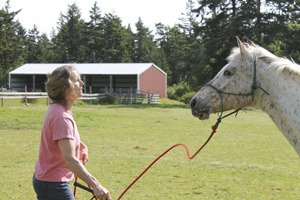By Marne Cook
Islands’ Weekly Intern
The horse walks slowly towards you and sniffs. The horse understands you and knows your feelings. Slowly you lift your hands to its head and begin to stroke its mane.
You just took a step towards building a relationship with your horse, which is the first step in Equine Facilitated Psychotherapy.
Kristin Fernald, who graduated with her masters in psychology from Antioch University in 1990, received her certification for Equine Facilitated Psychotherapy last fall.
Now, Fernald has finally found a way to incorporate both her passions into one.
“I have been a horse woman all my life,” said Fernald, who grew up riding horses.
Once she settled down and had children, her daughter also rode horses. However, once her daughter left for college, Fernald needed another excuse to follow her love of horses. As a result Fernald decided to get her certification in EFP.
Fernald explains that EFP is all about the making the connection with horses. The relationship that you make with this 1,000 pound animal can be very powerful.
There are three things one should understand about horses, according to Fernald.
First is that in a predator versus prey relationship, horses are considered prey. Fear comes before trust with these animals.
Therefore, a relationship with a horse must grow before it can trust. In building that relationship humans not only learn about their own fear, but also learn a lot more about trust.
Second, horses are very emotional animals. Humans and horses both have a limbic system in their brain. Among other things, the limbic system is in charge of the emotions we feel.
In general, humans are prone to shut that area of the brain off. Horses, on the other hand, are so in tuned with emotions they even know what humans are feeling. They can sense when actions are not congruent to inner feelings.
Through EFP, people learn to better connect with those emotions.
Third, horses are a herd animal. In nature they are part of a community and work in groups. EFP gives people the ability to better work with others and teaches them to know how to get along with others with ease.
“It is a very rewarding field to be in,” Fernald said. “EFP teaches people to understand where their energy is at and helps you know yourself better.”
Fernald has named her practice “Journeys through Wholeness” and will also be offering private lessons with her horses for “From the Ground Up,” learning the basics of horsemanship this summer.
She will also be offering small groups and private sessions with her horses for Equine Facilitated Therapy.
For more info, contact Fernald at www.kristinfernald.com or 468-3785.



